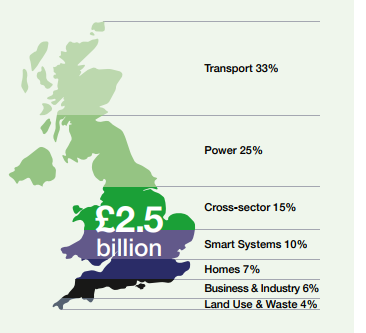UK released its long-awaited Green Growth Strategy setting out £2.5 billion in green investment
The UK Government released its climate action masterplan on how to decarbonise all sectors of the UK economy starting from 2020 and on how to reduce its carbon emissions by 57 percent by 2032.

The UK Government released its climate action masterplan on how to decarbonise all sectors of the UK economy starting from 2020 and on how to reduce its carbon emissions by 57 percent by 2032.
The Clean Growth Strategy constitutes a requirement of the UK Government, under the Climate Change Act and includes measures to cut emissions from buildings, transport, electricity, and heating.
From 2015-2021 the UK Government will have allocated in total £2.5 billion of public finding in low carbon innovation.
The biggest share of the investment will be spent in transportation, followed by the power sector.
Source UK Government
Energy efficiency is at the core of the new masterplan; as many houses as possible will be brought up to the minimum of energy band C by 2035, and existing efficiency schemes to improve insulation will be extended until 2028.
£3.6 billion of mixed investment will be invested to upgrade and insulate around 1 million homes and by 2020 the Government will launch the gradual phasing out of high carbon heating installations in new and existing homes.
This move is anticipated to save UK families around £300 on energy bills every year.
Offshore wind will continue to be favored, as the Government guaranteed a further £550 in subsidies through Contract for Difference auctions for new projects throughout the 2020s.
Nuclear power also has a place in the plan; £460 million will be allocated to research for future nuclear fuels, new manufacturing techniques, recycling and reprocessing et al.
New nuclear power stations will be encouraged, as long as they offer competitive energy prices.
£265 million will be invested in electricity storage and demand response technologies.
Prime Minister Theresa May said: "Clean growth is not an option, but a duty we owe to the next generation, and economic growth has to go hand-in-hand with greater protection for our forests and beaches, clean air and places of outstanding natural beauty”.
She added: "There is no conflict between this aspiration and our plan to create an economy that works for everyone”.
Greg Clark, Secretary of State for Business, Energy and Industrial Strategy said: “This government has put clean growth at the heart of its industrial strategy to increase productivity, boost people’s earning power and ensure Britain continues to lead the world in efforts to tackle climate change”.
As reported by the Guardian, Robert Gross, Director of the Centre for Energy Policy and Technology at Imperial College London, noted that it is evident that the greener wings of the Conservative Party have won out, pointing out the importance of the politics behind the strategy.
He said: “In 2015 the government started hacking and slashing at all manner of green policies. This has stopped, and that’s very welcome”.
John Sauven, the Executive Director of Greenpeace UK commented: “The strategy is in on the right track but we need a more ambitious destination.”
Prof Sam Fankhauser, Director of the Grantham Research Institute on Climate Change and the Environment at the London School of Economics, expressed his concerns about the vagueness of the plan by saying: “There is much to praise in the Clean Growth Strategy but there are also many aspirations rather than tangible policy commitments”.
You can read the full Green Growth Strategy here.






_400_250_80_s_c1.jpg)
